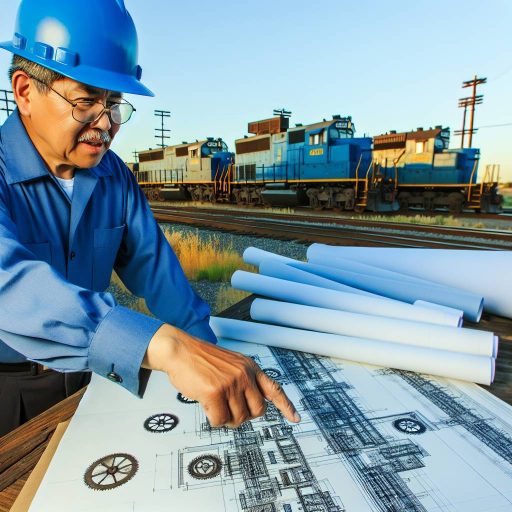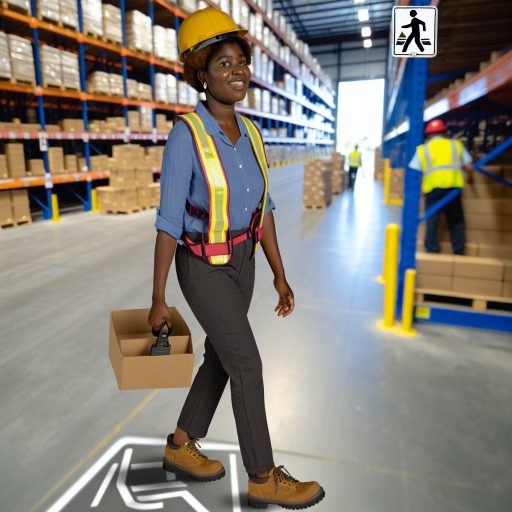Transportation and Urban Planning: An Overview
Transportation urban planning plays a crucial role in shaping the development of cities and communities.
It involves designing transportation systems to optimize efficiency and accessibility for residents.
The impact of transportation planning extends beyond just getting from point A to point B.
It influences urban design, land use, and overall quality of life for individuals.
As cities continue to grow and evolve, the demand for skilled professionals in transportation planning is on the rise.
Professionals in this field are tasked with addressing challenges such as traffic congestion, air pollution, and infrastructure development.
They work collaboratively with public agencies, private firms, and community stakeholders to create sustainable transportation solutions.
These solutions meet the needs of diverse populations.
The key responsibilities of transportation planners include analyzing data, conducting research, and developing long-term strategies.
They aim to improve transportation infrastructure continually.
Transportation planners must consider factors such as population growth, economic trends, and environmental impacts.
These factors are crucial when planning for future transportation needs.
In addition to technical skills, transportation planners must also possess strong communication and problem-solving abilities.
They engage with a range of stakeholders to gather input and build consensus.
Transportation planners advocate for innovative transportation solutions.
By working at the intersection of engineering, urban design, and policy, they play a vital role in shaping the future of our cities and communities.
A career in transportation urban planning offers a dynamic and rewarding opportunity.
This opportunity allows you to make a tangible impact on the built environment.
As the demand for sustainable and efficient transportation systems continues to grow, so does the need for skilled professionals in this field.
If you are passionate about creating livable and vibrant communities, consider exploring a career in transportation urban planning.
Transform Your Career Today
Unlock a personalized career strategy that drives real results. Get tailored advice and a roadmap designed just for you.
Start NowTransportation Urban Planning Overview
Transportation urban planning focuses on designing and managing transportation systems in urban areas to improve efficiency and safety.
Transportation planners play a crucial role in developing sustainable transportation solutions.
They promote accessibility and connectivity for all residents.
Transportation planners work closely with engineers, policymakers, and community stakeholders.
These collaborations address traffic congestion and improve public transit.
They also enhance pedestrian and cycling infrastructure.
By analyzing data and trends, transportation planners identify areas for improvement.
They prioritize projects that enhance mobility for all residents.
Their goal is to create integrated transportation networks.
These networks reduce greenhouse gas emissions and promote public health.
Additionally, they support economic growth in urban areas.
Transportation planners consider land use and zoning regulations as well.
This ensures transportation systems are integrated with urban development plans.
Transportation urban planning aims to create vibrant, livable communities.
Well-functioning transportation systems must meet the needs of residents and visitors.
Key Responsibilities of Transportation Planners
- Analyzing traffic patterns and designing efficient road networks.
- Developing public transit routes and schedules to improve accessibility.
- Implementing strategies to reduce congestion and improve air quality.
- Collaborating with stakeholders to gather input and feedback on transportation projects.
- Evaluating the impact of new developments on transportation infrastructure.
- Conducting studies to assess the effectiveness of transportation policies and programs.
Transportation urban planning is essential for creating sustainable, inclusive, and resilient cities.
Through strategic planning and collaboration, transportation planners can shape the future.
They design urban transportation systems that benefit everyone.
Exploring Career Opportunities in Transportation Urban Planning
Transportation urban planning is a dynamic field that offers a wide range of career opportunities.
Individuals interested in shaping the way cities and communities function will find various roles available.
Transform Your Career Today
Unlock a personalized career strategy that drives real results. Get tailored advice and a roadmap designed just for you.
Start NowTransportation Planner
Transportation planners are responsible for developing and implementing plans to improve transportation systems.
They analyze data, conduct research, and collaborate with stakeholders.
These efforts aim to design efficient and sustainable transportation networks.
Skills and qualifications needed:
- Strong analytical and problem-solving skills
- Proficiency in GIS and transportation modeling software
- Knowledge of urban planning principles
- Excellent communication and collaboration abilities
- A degree in urban planning, civil engineering, or a related field
Transportation Engineer
Transportation engineers focus on the design, construction, and maintenance of transportation infrastructure.
This includes roads, highways, and bridges.
They use engineering principles to improve traffic flow, safety, and accessibility.
Skills and qualifications needed:
- Proficiency in CAD and other design software
- Understanding of traffic engineering principles
- Experience with transportation project management
- Strong technical skills
- A degree in civil engineering or a related field
Transit Coordinator
Transit coordinators oversee public transportation services, including bus and rail systems.
They develop schedules, routes, and fare structures.
Efforts ensure efficient and reliable transportation options for residents.
Transit coordinators work with community partners to address diverse needs.
Skills and qualifications needed:
- Knowledge of public transportation systems
- Experience with transit planning and operations
- Strong organizational and logistical skills
- Ability to work with diverse stakeholders
- A degree in transportation planning, public administration, or a related field
A career in transportation urban planning offers the chance to make a tangible impact.
This includes enhancing the livability and sustainability of cities and communities.
By pursuing roles such as transportation planner, transportation engineer, or transit coordinator, individuals can contribute.
They ensure more efficient and accessible transportation systems for all residents.
See Related Content: Logistics Technician vs. Supply Chain Manager
Job Responsibilities in Transportation Urban Planning:
Transportation professionals play a crucial role in shaping the future of urban infrastructure.
Their responsibilities range from analyzing data to collaborating with various stakeholders to develop sustainable transportation plans.
Transform Your Career Today
Unlock a personalized career strategy that drives real results. Get tailored advice and a roadmap designed just for you.
Start NowTypical Responsibilities of Transportation Professionals:
- Conducting thorough studies on current transportation systems and infrastructure to identify areas for improvement.
- Analyzing data related to traffic patterns, public transportation usage, and environmental impact to inform decision-making.
- Developing transportation plans that prioritize efficiency, safety, and sustainability for urban areas.
- Collaborating with city officials, engineers, architects, and community members to gather input and ensure comprehensive planning.
- Working on multi-modal transportation projects that integrate various modes of transportation to create a seamless urban mobility network.
- Evaluating the economic impact of transportation projects on communities and businesses to ensure cost-effectiveness.
- Implementing innovative solutions such as smart transportation technologies, bike lanes, and public transportation enhancements.
- Monitoring the effectiveness of transportation plans through data collection, feedback from stakeholders, and on-site observations.
Importance of Collaboration in the Planning Process:
- Collaboration with other stakeholders is essential to ensure that transportation plans align with the needs and priorities of the community.
- Working closely with city officials helps integrate transportation plans with overall urban development strategies for a holistic approach.
- Engaging with engineers and architects allows transportation professionals to leverage technical expertise and ensure the feasibility of proposed solutions.
- Involving community members in the planning process fosters transparency, accountability, and inclusivity in decision-making.
- Coordinating with public transportation agencies ensures seamless integration of different modes of transportation for improved accessibility and connectivity.
- Partnering with environmental experts helps address sustainability concerns and minimize the ecological impact of transportation projects.
Transportation professionals in urban planning have diverse responsibilities that require collaboration, data analysis, and innovative thinking to create sustainable and efficient transportation systems for thriving urban communities.
Delve into the Subject: Key Challenges Faced by Packaging Engineers
Salary and Job Outlook:
When it comes to a career in transportation urban planning, professionals can expect a competitive salary that reflects their expertise and experience.
The average salary range for transportation planners typically falls between $55,000 to $90,000 annually, depending on various factors such as location, employer, and level of education.
Job Outlook for Transportation Planners:
- Growth Opportunities: Transportation planners are in high demand as cities and urban areas continue to grow and develop.
- With an increasing focus on sustainable transportation systems and infrastructure, professionals in this field have a bright future ahead.
- There are opportunities for advancement into senior or management roles as well.
- Potential Challenges: Despite the demand for transportation planners, there are some challenges that professionals may face.
- One of the challenges is navigating complex bureaucratic processes and securing funding for transportation projects.
- Additionally, balancing the needs and priorities of various stakeholders can be a challenging aspect of the job.
The job outlook for transportation planners is generally positive, with ample growth opportunities in the field.
While there may be challenges to overcome, the rewarding nature of the work and the chance to make a meaningful impact on urban development makes this career path an exciting and fulfilling choice for those interested in shaping the future of transportation in urban areas.
Uncover the Details: Warehouse Supervisor: Problem-Solving Techniques
Education and Training Requirements:
Obtaining a degree in urban planning, civil engineering, or transportation planning is essential.
Continuing education plays a crucial role in staying updated with the latest trends and technologies.
Professional certifications, such as the American Institute of Certified Planners (AICP), enhance credibility and expertise.
Advanced degrees, like a Master’s in Urban Planning, provide specialized knowledge and career advancement opportunities.
Internships and work experience in transportation planning firms or agencies help with practical skills and industry exposure.
Importance of Education and Training:
Education in urban planning equips professionals with skills in land use, transportation systems, and policy analysis.
Specialized training in civil engineering ensures a strong foundation in infrastructure development and design principles.
Knowledge of transportation planning concepts is vital for understanding commuter behavior, traffic patterns, and environmental impacts.
Continuing education allows professionals to stay abreast of emerging technologies and sustainable urban development practices.
Professional certifications demonstrate expertise and commitment to high ethical standards in urban planning and transportation management.
Professional Certifications in Transportation Urban Planning:
American Institute of Certified Planners (AICP) certification is recognized as the industry standard for urban planning professionals.
Transportation Planning Professional (TPP) certification focuses on transportation-specific skills and knowledge, enhancing career prospects.
LEED accreditation showcases expertise in sustainable design and development, a crucial aspect of modern urban planning projects.
Transform Your Career Today
Unlock a personalized career strategy that drives real results. Get tailored advice and a roadmap designed just for you.
Start NowProject Management Professional (PMP) certification demonstrates proficiency in managing complex transportation and infrastructure projects efficiently.
GIS Professional (GISP) certification provides valuable skills in geographic information systems, essential for data-driven transportation planning strategies.
Explore Further: How to Create Effective Distribution Plans

Internship and Networking Opportunities:
Explore the benefits of internships in transportation urban planning for gaining practical experience and building professional connections.
Internships play a crucial role in providing hands-on experience in the field of transportation planning.
Interns have the opportunity to work on real projects and contribute to the overall planning process.
Internships also allow students to apply theoretical knowledge to real-world scenarios.
Furthermore, interns have the chance to network with industry professionals and experts in the field.
Building connections during internships can lead to future job opportunities in transportation planning.
Tips on Networking with Industry Professionals:
Attend industry events, conferences, and workshops to meet professionals in the field.
Networking events provide a platform to exchange ideas, share experiences, and learn about new trends.
Utilize online platforms like LinkedIn to connect with professionals and stay updated on industry news.
Join professional organizations related to transportation planning to expand your network.
Participate in mentorship programs to gain insights from experienced professionals in the field.
Engage in informational interviews with industry experts to learn about their career paths and experiences.
Case Studies and Success Stories:
Transportation urban planning plays a crucial role in shaping cities for the future.
Let’s explore some real-world examples of successful transportation planning projects:
- Curitiba, Brazil: Curitiba is often cited as a model of efficient urban planning. The city implemented a bus rapid transit system that reduced congestion and improved accessibility for residents.
- Masdar City, UAE: Masdar City is a sustainable development that prioritizes walking, cycling, and public transportation over private vehicles. This approach has led to reduced emissions and improved air quality.
- London, UK: London’s introduction of the congestion charge has helped reduce traffic congestion and encourage the use of public transportation. This initiative has made the city more pedestrian-friendly and reduced pollution levels.
These success stories demonstrate the positive impact transportation professionals can have on creating sustainable and efficient transportation systems:
- Reduction in Traffic Congestion: By implementing smart transportation solutions, professionals can alleviate traffic jams and improve traffic flow in urban areas.
- Improvement in Air Quality: Sustainable transportation planning can help reduce emissions from vehicles, leading to cleaner air and a healthier environment for residents.
- Promotion of Active Transportation: Encouraging walking, cycling, and the use of public transportation can lead to a decrease in car dependency and promote a more active lifestyle among city dwellers.
Transportation professionals play a vital role in creating innovative solutions that address the challenges of urban mobility.
By learning from successful case studies and implementing sustainable practices, we can build cities that are more livable, efficient, and environmentally friendly.
Transform Your Career Today
Unlock a personalized career strategy that drives real results. Get tailored advice and a roadmap designed just for you.
Start NowCareer Opportunities in Transportation Urban Planning
After discussing various career opportunities in transportation urban planning, it is evident that this field offers a wide range of rewarding options.
From transportation planners to urban designers, there are diverse roles that one can explore.
Professionals in this field play a crucial role in shaping the future of cities and communities, making it a fulfilling career choice.
The demand for skilled individuals in transportation urban planning is expected to grow in the coming years, providing ample job prospects.
If you have a passion for creating sustainable and efficient transportation systems, pursuing a career in transportation urban planning can be a fulfilling and impactful choice.
Dive into this dynamic field and explore the diverse opportunities it has to offer!
Additional Resources
Career opportunities – Careers – About.usps.com
U.S. Department of Transportation
[E-Books for Sale]
The Big Book of 500 High-Paying Jobs in America: Unlock Your Earning Potential
$19.99 • 500 High-Paying Jobs • 330 pages
Explore 500 high-paying jobs in America and learn how to boost your career, earn more, and achieve success!
See All 500 High-Paying Jobs of this E-Book
1001 Professions Without a Degree: High-Paying American Jobs You Can Start Now
$19.99 • 1001 Professions Without a Degree • 174 pages
Discover 1001 high-paying jobs without a degree! Unlock career tips, skills, and success strategies for just $19.99!




